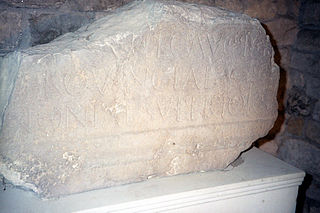Related Research Articles
The gens Acutia was a minor plebeian family at Ancient Rome. Members of this gens are mentioned from the early Republic to imperial times. The first of the Acutii to achieve prominence was Marcus Acutius, tribune of the plebs in 401 BC.
The gens Canidia was an obscure plebeian family at ancient Rome, first mentioned during the late Republic. It is best known from a single individual, Publius Canidius Crassus, consul suffectus in 40 BC, and the chief general of Marcus Antonius during the Perusine War. Other Canidii are known from inscriptions. The name Canidia was also used by Horace as a sobriquet for the perfumer, Gratidia.
The gens Numeria was a minor plebeian family at Rome. Few of its members held any of the higher offices of the Roman state.
The gens Numonia, occasionally written Nummonia, was a minor plebeian family at Rome. Members of this gens are first mentioned in the early years of the Empire. Few if any of the Numonii held any Roman magistracies.
The gens Occia was a minor plebeian family at Rome. Members of this gens are first mentioned under Tiberius, but must have been at Rome for much longer; for Tacitus speaks of Occia, a Vestal Virgin who died in AD 19, after serving faithfully for fifty-seven years. A few of the Occii pursued political careers in this period, but most are known only from inscriptions.
The gens Orbia was a minor plebeian family at Rome. No members of this gens are known to have held any magistracies, but many of them are known from inscriptions. The most illustrious of the family may have been the jurist Publius Orbius, a contemporary of Cicero.
The gens Pacilia was an obscure plebeian family at ancient Rome. Few members of this gens are mentioned by the ancient historians, of whom the most famous may be a certain Marcus Pacilius spoken of by Cicero in his second oration against Verres. However, many Pacilii are known from inscriptions.
The gens Percennia was a plebeian family at ancient Rome. Members of this gens first appear in history in the early years of the Empire, and several of them were of senatorial rank, although it is not known what magistracies they held. The most famous of the family may have been the Percennius who led a mutiny of the Pannonian legions in AD 14, which Drusus was obliged to put down.
The gens Pescennia was a plebeian family at ancient Rome. Members of this gens are first mentioned in the time of Cicero, but it was not until imperial times that they came to prominence. The Pescennii were of equestrian rank. The most illustrious of the family was Gaius Pescennius Niger, an able general, who was proclaimed emperor in AD 193, only to be defeated and put to death by Septimius Severus the following year.
The gens Petreia was a minor plebeian family at ancient Rome. Members of this gens are first mentioned toward the end of the second century BC, and several were distinguished as soldiers, but none of them ever attained the consulship.
The gens Rania was an obscure plebeian family at ancient Rome. Few members of this gens occur in history, but others are known from inscriptions. Lucius Ranius Optatus was consul in the early third century AD.
The gens Rasinia was an obscure plebeian family at ancient Rome. Hardly any members of this gens are mentioned in history, but a number are known from inscriptions. In imperial times a Gaius Rasinius Silo was governor of Noricum.
The gens Rufinia was an obscure plebeian family at ancient Rome. Few members of this gens are mentioned in history, although the derivative surname Rufinianus appears in several sources. A number of Rufinii are known from inscriptions.
The gens Salvidiena was a plebeian family at ancient Rome. Members of this gens are first mentioned toward the end of the Republic, and from then to the end of the second century they regularly filled the highest offices of the Roman state.
The gens Silicia, possibly the same as Selicia, was an obscure plebeian family at ancient Rome. Hardly any members of this gens are mentioned in history, but a number are known from inscriptions, many of them from Roman Africa.
The gens Servaea was a minor plebeian family at ancient Rome. Members of this gens are first mentioned during the reign of Tiberius, from which time they presumably rose steadily through the imperial bureaucracy, attaining the consulship under Domitian. A number of inscriptions from the second century or later indicate some of them had settled in Africa, where one family of this gens became particularly illustrious under the Antonine and Severan dynasties.
The gens Servenia was a minor plebeian family at ancient Rome. No members of this gens are mentioned in ancient writers, but a number are known from inscriptions, dating from the late Republic to the third century. At least some of the Servenii attained senatorial rank under the early Empire. None of them appear to have held the consulship, but Lucius Servenius Cornutus was praetor, and an important provincial governor under the Flavian dynasty.

The gens Iallia was an obscure plebeian family at ancient Rome. Members of this gens are not mentioned in ancient writers, but they rose to prominence during the middle part of the second century, with two of them achieving the consulship under Antoninus Pius.
The gens Iasdia was an obscure plebeian family at ancient Rome. Hardly any members of this gens appear in history, but a few are known from inscriptions. They were briefly prominent during the first half of the third century.
The gens Javolena, occasionally found as Javolenia, was a minor plebeian family at ancient Rome. Few members of this gens appear in history, but two of them attained the consulship, one under Domitian, and the other in the time of Antoninus Pius.